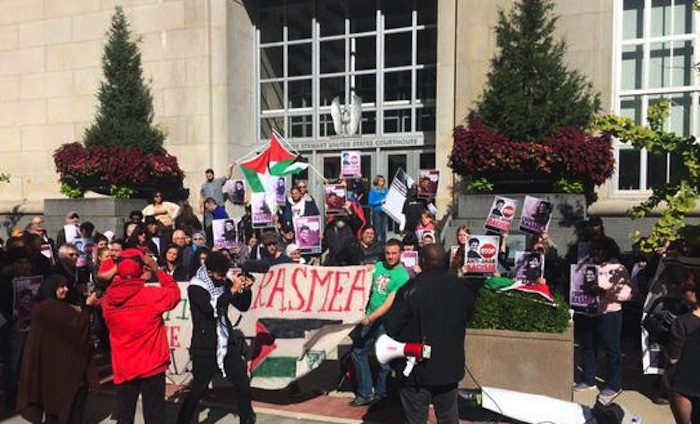
|
| Odeh’s supporters in front of the court in Cincinnati |
CINCINNATI — Appealing the November 2014 federal conviction of Palestinian American activist Rasmea Odeh, lead defense attorney Michael Deutsch gave a powerful oral argument in front of a panel of three judges in Cincinnati, at the U.S. Court of Appeals for the 6th Circuit.
Hammering home the point that Odeh never received a full and fair trial in Detroit last year, Deutsch argued that at her trial for Unlawful Procurement of Naturalization, she should have been able to testify about her state of mind when she filled out her citizenship application in 2004.
Odeh was convicted and sentenced to 18 months at Detroit’s U.S. District Court last year for not declaring that she was convicted of a bombing of Israel on her naturalization application. In Israel, the Palestinian activist was tried in a military court, which convicts 99.74 percent of Palestinians who come before it. She says interrogators forced her to confess by using torture and sexual assault.
According to a pre-trial testimony by a psychological expert, Odeh suffers from Post-Traumatic Stress Disorder because of what she endured in Israel. But Judge Gershwin Drain disallowed evidence of torture and PTSD to be presented before the jury.
Odeh remains free on bail.
Prosecutor Jonathan Tukel told the judges in Cincinnati that testimony from a psychologist should be inadmissible and could not stand up to scrutiny. The judges responded by pointing out that the legal precedent he was citing was an unpublished opinion, not any kind of legal precedent the court is bound to uphold.
Following the 30-minute hearing, Odeh, her attorneys supporters joined a number of additional followers outside the courthouse for a rally featuring Deutsch, Frank Chapman of the Chicago Alliance Against Racist and Political Repression, Brian Taylor of Black Lives Matter Cincinnati, Jess Sundin of the Committee to Stop FBI Repression, and others.
Chapman, a veteran Black organizer who has traveled to almost all of Odeh’s court appearances, said, “Make no mistake; this is a racist, political prosecution against Rasmea because she is a Palestinian who organizes for her people’s liberation.”
Deutsch thanked the crowd and explained how important it is to fill the courtroom. “It means a lot to Rasmea, and also shows the court that she is loved and respected,” he said.
He then answered questions about the appeals process, saying that a decision could be rendered between one and four months from now. If the court agrees with the defense and overturns the conviction and the sentencing, the case gets sent back to the prosecution to possibly re-file charges, whereupon the entire trial process begins anew.
But this time, evidence of torture, Post-Traumatic Stress Disorder (PTSD), etc., would be allowed into the courtroom. Also, the court, without reversing the conviction, could simply compel Judge Drain to allow for another evidentiary hearing with the psychological expert. Alternatively, if the court upholds the conviction but disagrees with the sentence, the appellate judges send new sentencing guidelines back to Drain for re-sentencing.
If the conviction and sentencing would be upheld, meaning that she would have to serve 18 months in prison and then be deported. If this happens without the decision being unanimous, the defense could ask that all of the 6th Circuit appellate court judges, not just the three panelists, review the case.
If this does not work, then a last ditch effort could be an attempt to appeal to the Supreme Court, which hears only 2 percent of cases filed.






Leave a Reply